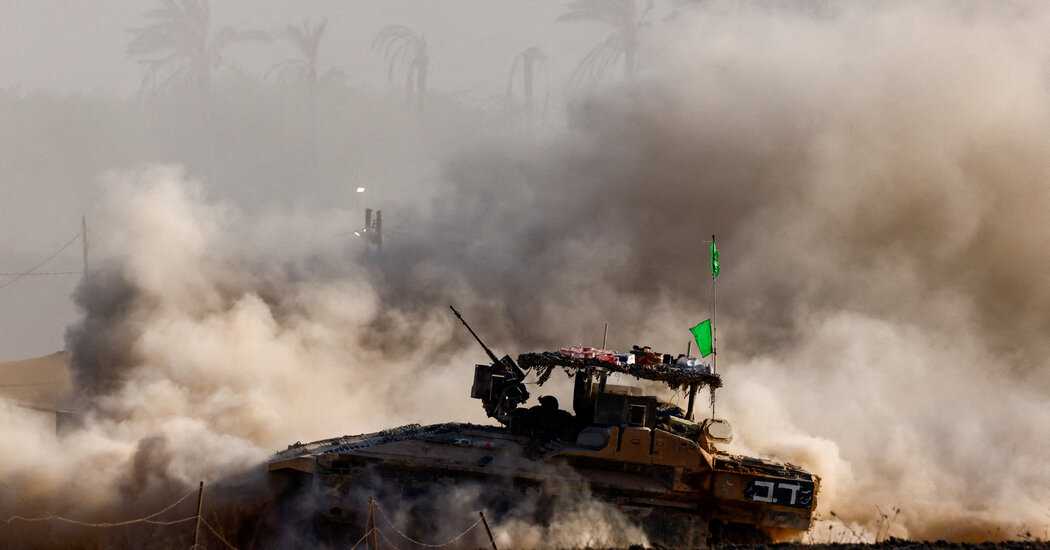Israel’s military is moving forward on plans to take over Gaza City, officials said Wednesday, even as Prime Minister Benjamin Netanyahu weighs a Hamas cease-fire proposal that would anger hard-liners in his government but, potentially, ensure the safe release of some hostages.
Troops had reached the city’s outskirts and tents were being moved into southern Gaza for people who would be displaced from their homes once the operation begins, an Israeli military official who requested anonymity in line with military protocol said at a briefing for journalists.
On Wednesday, Defense Minister Israel Katz said separately that he had approved mobilizing more reservists and extending orders for others for the fighting in Gaza. “I instruct you to use all tools and all power to strike the enemy until it is subdued, and to protect I.D.F. soldiers,” Mr. Katz told Israeli troops, referring to the Israel Defense Forces, according to a statement from his ministry.
The new assault aims to prevent Hamas from regrouping and planning future attacks, the Israeli military official said at the briefing. That comes after nearly two years of Israel’s war against Hamas, which has largely leveled the Gaza Strip and brought parts of it to the brink of famine.
The official said that an additional 50,000 reservists — bringing the total to 120,000 — would be told to report for duty in September to backfill other soldiers who would be going into Gaza City. Reservists who are already on duty could see their missions extended, the official said.
The Israeli military said in a later statement that 60,000 new reservists would be called to duty and 20,000 reservists would have their orders extended.
The Israeli official at the briefing described the military operation as “gradual, precise and targeted,” saying it would extend into areas of Gaza City where Israeli soldiers have not previously been during the war. The city and its surrounding neighborhoods remain a main stronghold for Hamas fighters and the militants’ government, the official said.
But a 60-day cease-fire plan, put forward earlier this week and approved by Hamas, could pause the operation.
Mr. Netanyahu is under increasing pressure from his hard-right political allies to reject the proposal, which has been called a “partial deal” because it would neither immediately release all the Israeli hostages nor end the war.
But its terms are similar to those Israel has previously accepted, according to officials briefed on its contents, who spoke on the condition of anonymity to discuss sensitive diplomacy.
An earlier proposal, which President Trump said in July that Israel had endorsed, called for the release of 10 living hostages and the bodies of 18 others during the 60-day period in exchange for Palestinian prisoners. Up to 20 hostages are still believed to be living, according to the Israeli authorities. The bodies of 30 others, they say, are also being held in Gaza.
Talks to reach that deal ultimately collapsed, and Mr. Netanyahu has not publicly shared his position on the new cease-fire proposal, which was announced this week by Qatari and Egyptian mediators.
On Wednesday, a hard-line minister in Mr. Netanyahu’s government, Orit Strock, warned the prime minister in an Israeli radio interview about accepting a deal that does not defeat Hamas and puts “the value of returning the hostages above the national interest.”
“This will push the country into a horrible abyss,” Ms. Strock, a member of the far-right Religious Zionism party, told Army Radio. “So it is very possible that we will say we will not be prepared to lend our hand to the government.”
Many Israelis fear that Hamas will kill the remaining Israeli hostages being held in Gaza if the military operation proceeds. The families of the hostages on Wednesday demanded a meeting with Mr. Katz, the defense minister, and the military’s chief of staff, Lt. Gen. Eyal Zamir,.
“Approving plans to occupy Gaza, while there is a deal on the table for Netanyahu’s approval, is the essence of torpedoing it, and a stab to the heart of families and the public in Israel,” a group representing the hostages’ relatives, said in a statement.
“Everyone knows that the conditions are ripe for a deal, and it is in your hands,” it said, appealing to Mr. Netanyahu.
The Israeli military official said the new operation also will expand humanitarian aid in southern Gaza where displaced people are being told to move to avoid being caught in crossfire. That will include opening new aid distribution sites and ensuring there is no fighting near them, and opening new routes for trucks to safely bring more supplies.
Gaza’s Civil Defense, the territory’s main emergency service, said at least five people were killed and three wounded in overnight attacks Wednesday at a displacement camp south of Gaza City, near Deir al-Balah. Separately, an Israeli statement said it had launched airstrikes against militants, killing 10, after being attacked in southern Gaza, near the city of Khan Younis.
More than 60,000 Palestinians have been killed since the Hamas-led Oct. 7 attack on Israel that ignited the war in Gaza, according to the Gazan health ministry, which does not distinguish between combatants and civilians.
Aaron Boxerman and Gabby Sobelman contributed reporting.
Lara Jakes, a Times reporter based in Rome, reports on conflict and diplomacy, with a focus on weapons and the wars in Ukraine and the Middle East. She has been a journalist for more than 30 years.
The post A Move on Gaza City Has Started, Israel’s Military Says appeared first on New York Times.




